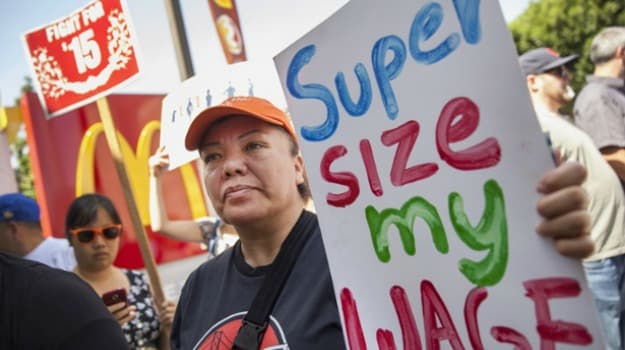Protesters rally and close down a McDonald's restaurant in downtown Oakland in 2014. Photograph: Kim Kulish/Kim Kulish/Corbis
- Directly employed workers to be paid $1 an hour above local minimum wage
- Policy will not apply to 95% of staff who are employed by franchisees
McDonald's will raise pay for 90,000 of its US employees starting on 1 July, according to the Wall Street Journal. Only employees working directly for McDonald's will qualify for the increase.
McDonald's says it will pay at least $1 per hour more than the local minimum wage where a company-owned restaurant is located, bringing the average hourly rate for its US employees to $9.90. The company expects the average to reach more than $10 by the end of 2016, as minimum wages increase across the US.
Employees who have been with McDonald's more than a year will also begin to accrue up to five days of paid time off each year.
"Because we joined together and stood up, McDonald's was forced to raise pay. Still, this is too little to make a real difference, and covers only a fraction of workers. It's a weak move for a company that made $5.6bn in profits last year," said Kwanza Brooks, a McDonald's worker from Charlotte, North Carolina, in a statement. Kwanzaa makes $7.25 an hour. "We're going to keep fighting until we win $15 and union rights for all fast-food workers and our families."
Changes in pay will not apply to McDonald's workers employed by their franchisees. About 90% of 14,350 US McDonald's restaurants are "independently owned and operated by franchisees", according to the company.
The pay raise will apply to about 5% of employees, McDonald's workers said on a conference call after the announcement.
McDonald's has long been a target of higher-wage activists. In 2014, the fast-food giant saw its employees walk out, stage sit-ins and carry out other acts of civil disobedience on multiple occasions. Most recently, during the Golden Globes, its Signs ad campaign - designed to emphasize the company's role in local communities - sparked outrage on social media as viewers called on the company to raise its wages.
The decision by McDonald's to raise wages comes after Walmart, Target and TJ Maxx have all pledged to increase their wages.
Raising wages, however, requires an investment. According to its earnings call, the increase in wages and changes to its training, hiring and managing practices will cost Walmart $1bn. As a result, Walmart's cost of doing business is going up, potentially cutting into profits, noted Goldman Sachs analyst Matthew Fassler.
With its profits dropping by as much as 15% a year, McDonald's may have a difficult time justifying raising wages to its shareholders.
Steve Easterbrook, who recently took over as CEO of McDonald's, hopes that the wage increase will improve morale and customer service.
"Motivated teams deliver better customer service and delivering better customer service in our restaurants is clearly going to be a vital part of our turnaround," Easterbrook told the Wall Street Journal.
"In addition to our constant focus on product and digital, and against the backdrop of wage increases at key restaurants/retailers, we think an important focus in Steve Easterbrook's first year will need to be addressing employee perception and satisfaction scores," UBS analyst Keith Siegner wrote last week. "Negative McDonald's employment perceptions have had a seemingly detrimental impact on the brand and results."
Before this announcement, McDonald's had insisted that it paid its employees a fair wage.
"The topic of minimum wage goes well beyond McDonald's - it affects our country's entire workforce. McDonald's and our independent franchisees support paying our valued employees fair wages aligned with a competitive marketplace," Becca Hary, director of global media relations at McDonald's, told the Guardian in January.
Few fast-food business pay their employees more than the federally mandated minimum wage of $7.25 an hour. One is In-N-Out Burger, which has been known to pay its new part-time associates $10 an hour. Another is Moo Cluck Moo, which when it first opened paid its employees $12 an hour and now pays $15 an hour.
"Because of our low turnover, and the fact that people are really into their jobs, $15 an hour wasn't a big stretch," Brian Parker, co-founder of Moo Cluck Moo, told NPR.
On 15 April, McDonald's workers will be joined by other low-wage employees such as Walmart employees, home care workers and airport workers as they continue to demand $15 an hour.










